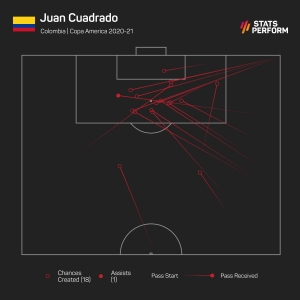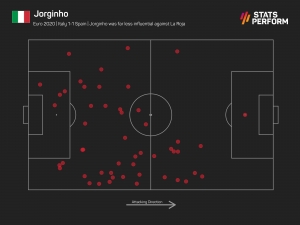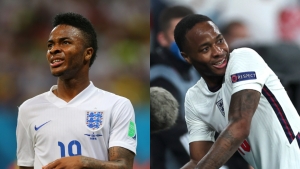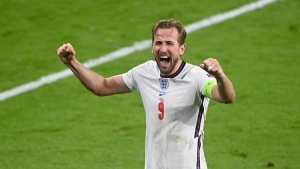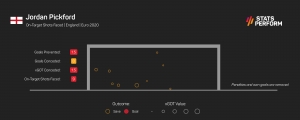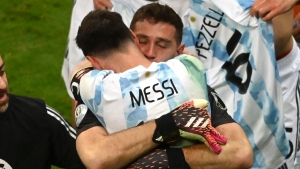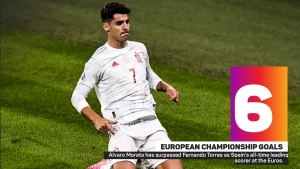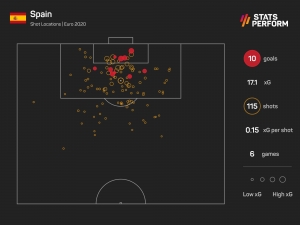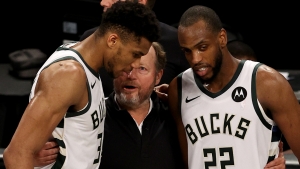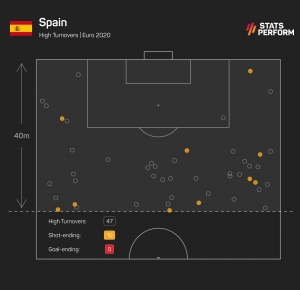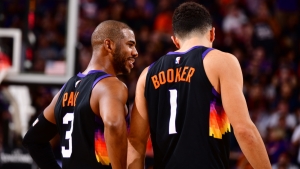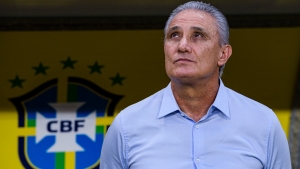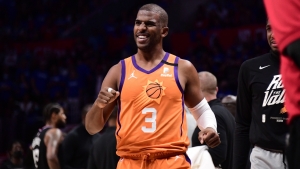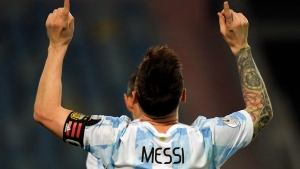In the immediate, dazzling afterglow of England beating Denmark 2-1 over 120 minutes to secure a first major final appearance since 1966, Gareth Southgate praised his team's resilience.
That quality has always been readily associated with his country's national team. Perhaps you think of Terry Butcher's blood-stained head bandage or Stuart Pearce screaming maniacally after exorcising his penalty shoot-out demons.
Or maybe less successful iterations. Even when they've not been so accomplished on the field, there is a common perception of England being good for going down swinging, raging against the dying of the light to find glory in failure.
Raheem Sterling doesn't fit that template. The Manchester City forward is one of the most successful and decorated players of his generation, with eight major honours to his name at club level, most of which he has played a decisive role in securing.
That sounds like the sort of player who might be England's standout performer as they await Sunday's date with Italy and destiny at Wembley. And he is – at Euro 2020, Sterling has been electrifying as the driving force of Southgate's side.
But the acclaim to match that status has been hard to spot, maddeningly so at certain points of his career. Although he is cut from a different cloth to Butcher, Pearce or the archetypal English "warrior" footballer, Sterling is arguably the most resilient player England has ever seen. Whether he should have to have been so resilient is another matter entirely.
From the boy wonder to #TheHatedOne
On Sunday, Sterling goes back to the start, returning again to the stadium that overlooked his boyhood home, the canvas for fantastical daydreams, and to the opponents he faced on his major tournament debut at the 2014 World Cup.
Roy Hodgson's England crashed out without winning a game in Brazil, but none of the blame was pinned on a fresh-faced 19-year-old who represented a hope of better days to come.
Handed the number 10 role behind then club-mate Daniel Sturridge, Sterling dazzled early on in the 2-1 defeat to Italy in Manaus, taking his form from a breakout season at Liverpool into national colours. A now familiar scampering dribble preceded a 25-yard drive that rippled the side netting. So close to the opener and an optical illusion of a goal that sent pints flying in pubs back home.
That was only Sterling's fifth cap and the first time he completed 90 minutes for England, but any honeymoon was over a year later when he was booed during a friendly away to the Republic of Ireland. Dublin is a Liverpool stronghold and the winger's wish to leave Anfield had become laced with bitterness and acrimony.
His desire to join City has been vindicated through weight of trophies and achievements, although the jury remained out after a tough first season under Manuel Pellegrini at the Etihad Stadium and he was the focus of ire during England's unhappy Euro 2016 campaign.
In a social media post, he labelled himself #TheHatedOne following criticism of his performance during the 1-1 draw with Russia. Against Wales, he missed a glorious chance to score and was substituted at half-time.
Sterling returning to the side to win an early penalty was long forgotten by the time minnows Iceland completed their 2-1 last-16 win over Hodgson's beleaguered team. In the days following that debacle, one newspaper branded him "Obscene Raheem" on its front page for "showing off" his "blinging house".
It turned out Sterling bought the property for his mother, who raised him alone in Jamaica and then London after his father was murdered.
"I'm not normally the person to talk but when I think I need my point heard I will speak up"
Those early challenges of Sterling's resilience – whatever undertones might have accompanied assertions that he was some sort of ungrateful money grabber – were related to his sporting performance, even if the tabloid takedown was utterly tenuous and tawdry.
Coming through failure on the biggest stages to succeed over and over demonstrates thrilling resilience that fans love to see; the sort of resilience that allows great performers to realise sport's most narratively compelling moments.
But Sterling has also frequently delved into reserves no one should have to call upon in a decent society.
"Someone called my name – my full name – so I thought, 'Oh, they probably know me'. At this point people were starting to recognise me a bit," Sterling told GQ in 2019, recalling the first time he suffered racial abuse after joining Liverpool as a schoolboy.
"He says, 'Can I speak to you for a second?' I said, 'Yeah, no problem.' So I walk across the road and then he says the n-word and he headbutts me.
"I took care of the rest. A hundred per cent he regretted it."
In some ways, it feels like Sterling has been taking care of the rest ever since. Like when he was assaulted and racially abused at City's training ground in December 2017 by a Manchester United supporter. Later that day, he scored twice in a 4-1 win over Tottenham.
Or when he was abused by fans at Stamford Bridge a year later and responded with an eloquent Instagram post calling for equal treatment of black and white footballers in the media, urging an end to any coverage that "helps fuel racism and aggressive behaviour".
Or when he was one of several England players targeted by monkey chants in Montenegro and Bulgaria in 2019, when he scored in 5-1 and 6-0 wins.
Sterling was also at the forefront of football supporting Black Lives Matter following the killing of George Floyd and received an MBE last month in recognition of his work promoting racial equality.
But there was weariness when he discussed his activism in an interview with ITV last week, one that is entirely understandable when a minority of fans boo him and his England colleagues for taking the knee before kick-off – their peaceful, dignified protest against racial injustice.
It feels even more understandable when UK government ministers who gave licence to those booing and dismissed kneeling as a "gesture" are now firing out #ItsComingHome tweets at every opportunity, wearing England shirts or standing on a massive flag.
"It's not something I'm killing myself to do anymore, I'm not going to be on the frontline speaking about it. We're adults enough now to understand these things. I just feel, when it comes to racial abuse, it's not taken seriously," Sterling said.
"Everything we have done in the past, without him would not have been possible"
A line of attack for those dubious on Sterling's capabilities over recent years has been to suggest his status as an inspiring role model means shortcomings on the pitch are overlooked.
That specious logic falls down when you consider Pep Guardiola's ruthlessly unsentimental approach to constructing football teams.
Since inheriting Sterling in 2016, he has signed Leroy Sane, Nolito, Gabriel Jesus, Bernardo Silva, Riyad Mahrez and Ferran Torres – all players able to operate with some distinction and capped by their countries in wide attacking roles.
Until a poor run of form in the second half of last season, Sterling saw them all off – becoming as close to an untouchable as Guardiola allows. He is one of only three players to have scored 100 goals under the Catalan's management. The others are Lionel Messi and Sergio Aguero.
Guardiola does not pick Sterling because he is "an incredible person, incredible human being", as he said in the wake of the Stamford Bridge abuse. In January this year, when Sterling's form was questioned in a news conference, he sharply retorted: "Everything we have done in the past, without him would not have been possible."
When City won the Premier League title with 100 points and also lifted the EFL Cup in 2017-18, Sterling scored 23 goals and supplied 15 assists in all competitions. In 2018-19, when his brace in the FA Cup final helped to round off an unprecedented domestic treble, those numbers were up to 25 goals and 15 assists.
The 2019-20 season was Sterling's most prolific with 31 goals, although it ended with a horror miss in a Champions League quarter-final loss to Lyon. His conversion of opportunities Opta rank as "big chances" was down from 58.1 per cent in 2018-19 to 39.7.
Unreliable finishing remains an unwanted feature of Sterling's game and was once again the focus when goals dried up en route to a third Premier League title in four years last season.
Overall, 24 goal involvements (14 goals and 10 assists) represented his lowest since Guardiola's first season in 2016-17, but far from a disaster. For some, however, it seemed a 30-goal campaign should be the norm and Sterling was useless for falling away from three seasons of incredible consistency.
Just a tap-in merchant who'd been found out. With the likes of Jadon Sancho, Marcus Rashford, Phil Foden and Bukayo Saka in his squad, why on earth would Southgate persist with Sterling?
"Have I justified my place in the team?"
It was easy to fear for the player with a tattoo of himself as a boy looking up at the Wembley arch, who appeared wretchedly out of form when recalled for City's Champions League final defeat to Chelsea. The moment he had spent a career and a lifetime anticipating was around the corner and he looked ill-equipped to grasp it.
Plus, England duty under the glare of the nation had previously not been too kind to Sterling. Across 12 games and 828 minutes in major tournaments heading into Euro 2020, he had no goals and one assist.
"It's not been an easy road with the national team in the past. Some, I'd say, unfair flack that I would get before touching a football sometimes," he told BBC Sport
"As a young person it was difficult to deal with. In life and football you have to challenge yourself and take it for what it is. You can't be down on yourself, you have to push yourself even more.
"That's what I've kept doing and I think that's one of my best traits."
Sterling performed tirelessly for the cause as England reached the semi-finals of the 2018 World Cup, but the paucity of his return in front of goal left him on the outside looking in when it came to the feelgood factor that enveloped the bulk of Southgate's squad.
We're back to the resilience again, because the forward produced the best season of his career in 2018-19 to be named Football Writers' Association Player of the Year. He also enjoyed belated lift-off with the Three Lions.
Heading into an October 2018 Nations League showdown against Spain in Seville, he had two goals and nine assists in 45 caps. He netted two more in a thrilling 3-2 win. From cap 46 to his 67th versus Denmark he has scored 15 and laid on another seven – averaging a goal involvement every 87 minutes.
This is the version of Sterling that Southgate and England have enjoyed so much at Euro 2020, where he sealed 1-0 group stage wins over Croatia and the Czech Republic before breaking the deadlock against Germany to spark round-of-16 pandemonium in his neighbourhood.
It is perhaps a little sweeter that this purple patch for his country has come at a time when relations with Guardiola have come to appear strained. Another example of Sterling being damned with faint praise is his improvement at City being frequently cited – although, it should be said, never by the manager himself – as a triumph of coaching genius as much as his own endeavours.
He ended extra time against Denmark tearing through a shattered opposition defence to draw another save from Kasper Schmeichel. He was everywhere in a performance Gary Lineker hailed as "one of the greatest displays I've seen from a player in an England shirt".
Sterling has attempted (32) and completed (18) more dribbles than any other player at Euro 2020. He has never had more touches in the opposition box (38, 13.3 per cent of his overall touches) at any previous tournament. His expected goals (xG) and expected assists (xA) figures of 3.82 and 1.14 are also far in excess of past efforts and paint a picture of a player almost always involved when England create high-quality chances.
This is player-of-the-tournament form. By Sunday night, it might stand as the greatest ever showing in this setting by an Englishman.
But if it all goes wrong, a sitter is missed and the insults fly again – he's a diver now, you see, as well as a tap-in merchant – the seven years since that first tangle with Italy tell us Sterling will bounce back with all the fearlessness, brilliance and resilience we should have long since learned to cherish.























